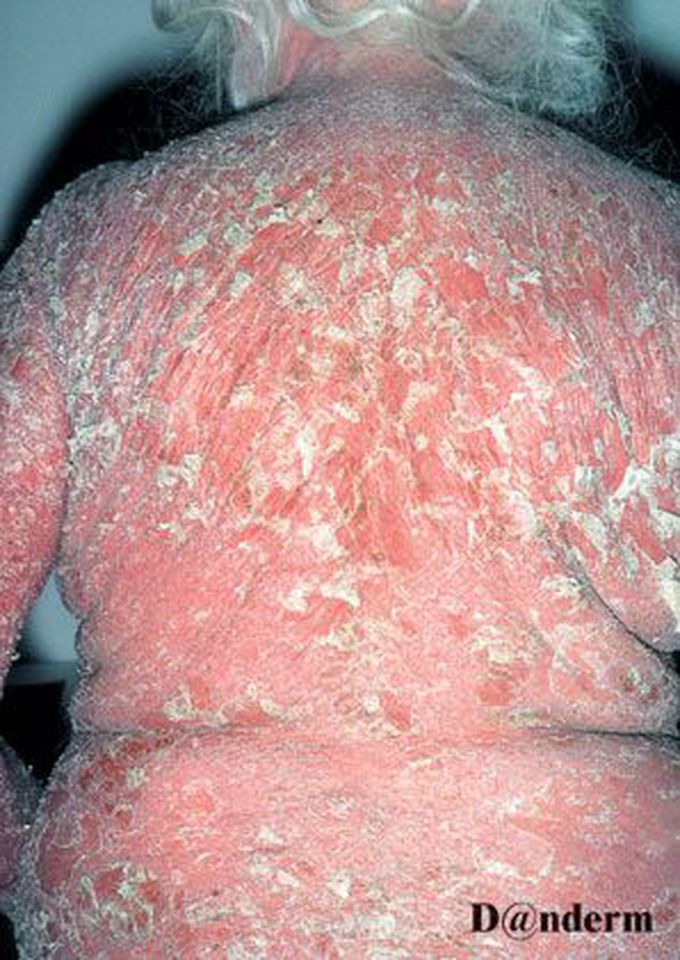


Erythrodermic psoriasis
Erythrodermic psoriasis is an uncommon, aggressive, inflammatory form of psoriasis. Symptoms include a peeling rash across the entire surface of the body. The rash can itch or burn intensely, and it spreads quickly. Erythrodermic psoriasis is one of the most severe types of psoriasis. If complications develop, it can be life-threatening. The condition most often affects people who already have unstable plaque psoriasis. It can also occur at the onset of an episode of plaque psoriasis or alongside another rare type of psoriasis called von Zumbusch pustular psoriasis.Scientists are not sure exactly what causes psoriasis, but it appears to be due to an overactive immune system. Why erythrodermic psoriasis develops, however, remains unclear. In people with psoriasis, the body produces an excessive number of T cells, which are a kind of white blood cell that usually fends off bacteria and viruses. In psoriasis, these T cells attack healthy skin cells. An overproduction of skin cells occurs as a result, alongside other symptoms. The symptoms of psoriasis mostly appear on the skin, but the condition can also affect the nails, joints, and other parts of the body. Triggers The exact causes of erythrodermic psoriasis are unclear, but some factors can trigger a flare.These include: suddenly stopping psoriasis treatment the use of certain psoriasis treatments the overuse of corticosteroids infections sunburn emotional stress excessive alcohol consumption allergic reactions and rashes oral steroid medications he signs and symptoms of erythrodermic psoriasis can be intense. Symptoms may appear suddenly at the onset of a new case of psoriasis, or they may begin gradually during a plaque psoriasis flare. Symptoms of erythrodermic psoriasis include: severe skin redness over a large part of the body skin shedding that occurs in large sheets rather than smaller flakes or scales pustules or blisters burnt-looking skin severe itching intense pain increased heart rate fluctuations in body temperature These symptoms will affect most people during an erythrodermic psoriasis flare. Erythrodermic psoriasis can alter the chemistry of the body. For this reason, people may also experience other symptoms. These include: swelling, especially around the ankles joint pain chills or fever Erythrodermic psoriasis can be difficult to treat, especially if complications develop. Treatments include topical treatments and drug therapy. A person's treatment options will depend on the severity of their symptoms and the presence of any other health conditions. Topical treatments include: topical steroid creams and moisturizers wet dressings oatmeal baths Emergency treatment consists of IV fluid and electrolyte replacement to treat or prevent dehydration. Some systemic medications, which affect the whole body, are also available. The doctor may prescribe oral medication or deliver the drug through an injection or an infusion. Drug treatment Cyclosporine (Neoral) and infliximab (Remicade) are standard first-line treatments for erythrodermic psoriasis. The medical board of the National Psoriasis Foundation note that these appear to be the fastest-acting therapies. Some doctors may prescribe methotrexate (Otrexup) or acitretin (Soriatane) instead, but these work more slowly. Once a person's condition is stable, the doctor may recommend changing to another drug, possibly etanercept (Enbrel), or using combination therapy. Biologics Biologic drugs, such as etanercept or adalimumab (Humira), which are tumor necrosis factor (TNF)-alpha inhibitors, and some interleukin (IL) agents are effective treatments for moderate to severe erythrodermic psoriasis Newer biologics target different genes (medically reviewed by Debra Sullivan, Ph.D., MSN, R.N., CNE, COI on February 19, 2019 — Written by Jenna Fletcher)


